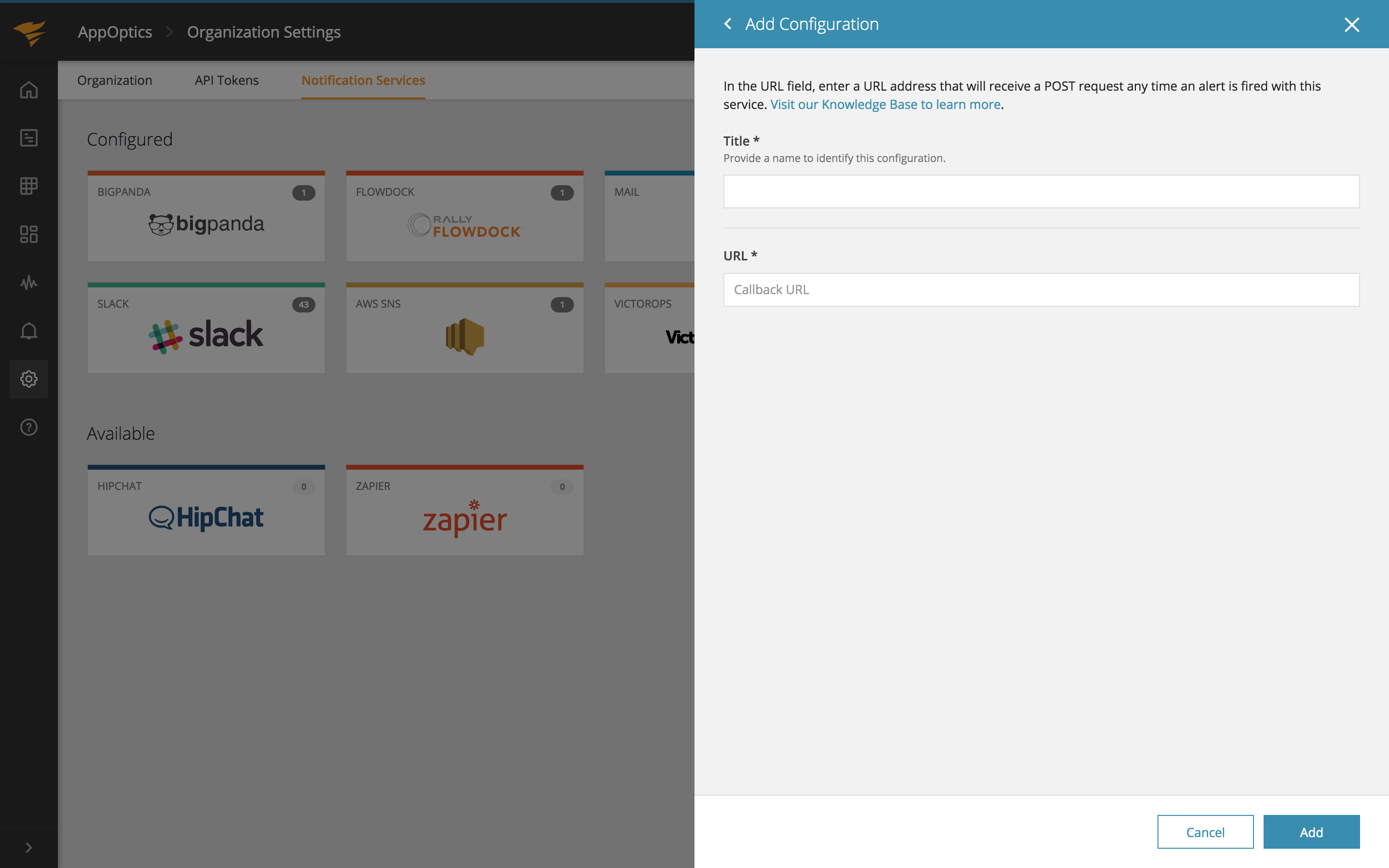Webhook
A WebHook is a simple event-notification via HTTP POST. This service sends the alert payload to a URL that you specify any time the alert is triggered.
Webhook Configuration
Navigate to the "Notification Services" section under "Settings" on the menu to the left. Click on the Webhook integration, then on the "Add Configuration" button.

Enter a name for the service webhook in the Title field. In the URL field, enter a URL address that will receive a POST request anytime an alert is fired with this service.
Creating Alerts
After setting up the service you can tie alerts to a service destination. You can read more about creating alerts in the Alerts knowledge base article.
POST request
When an alert is fired that uses the webhook service a POST request will be made to the URL provided. The POST request will be in the format used by the github-services suite of webhook handlers. The POST body will contain a single parameter called payload, which will contain a JSON hash.
Example Payloads
The following is an example payload sent to the POST address when the webhook is triggered:
{
"alert": {
"id": 5846005,
"name": "collectd.high.load",
"runbook_url": "http://example.com/runbook.pdf",
"version": 2
},
"incident_key": "<key that uniquely identifies this alert incident>",
"account": "m@example.com",
"trigger_time": 1444177459,
"conditions": [
{
"id": 1150670,
"type": "above",
"threshold": 2,
"duration": 300
}
],
"violations": {
"example-ubuntu-14.04": [
{
"metric": "collectd.load.load.shortterm",
"value": 7.190000057220459,
"recorded_at": 1444177454,
"condition_violated": 1150670,
"count": 31,
"begin": 1444177140,
"end": 1444177440
}
]
}
}Example payload for a Cleared Alert:
{
"payload": {
"alert": {
"id": 6268092,
"name": "a.test.name",
"runbook_url": "",
"version": 2
},
"incident_key": "<key that uniquely identifies this alert incident>",
"account": "youremail@yourdomain.com",
"trigger_time": 1457040045,
"clear": "normal"
}
}The trigger_time in this payload is the timestamp when the alert cleared, not when the alert originally fired.
Encoding
The payload JSON hash is encoded with application/x-www-form-urlencoded, as is standard for all POST requests. Apps rarely need to consider this because almost all Web frameworks automatically URL-decode the POST contents. In those cases, the app only needs to decode JSON.
Navigation Notice: When the APM Integrated Experience is enabled, AppOptics shares a common navigation and enhanced feature set with other integrated experience products. How you navigate AppOptics and access its features may vary from these instructions.
The scripts are not supported under any SolarWinds support program or service. The scripts are provided AS IS without warranty of any kind. SolarWinds further disclaims all warranties including, without limitation, any implied warranties of merchantability or of fitness for a particular purpose. The risk arising out of the use or performance of the scripts and documentation stays with you. In no event shall SolarWinds or anyone else involved in the creation, production, or delivery of the scripts be liable for any damages whatsoever (including, without limitation, damages for loss of business profits, business interruption, loss of business information, or other pecuniary loss) arising out of the use of or inability to use the scripts or documentation.
